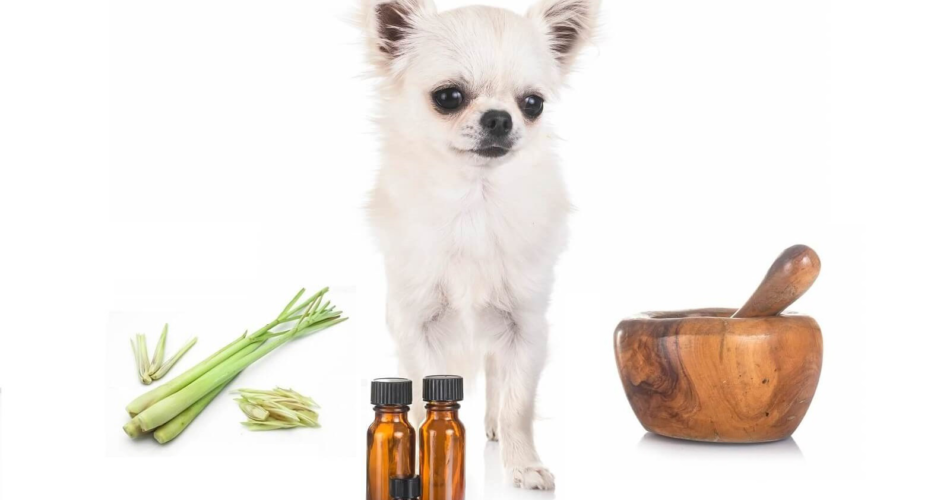Lemongrass is a common plant in Australia, Asia, and Africa. It has multiple uses, including aromatherapy, soap making, culinary and medicinal uses. Lemongrass can be around the home in different forms like its leaves or processed essential oil. With our dogs also sharing our homes with us, they could easily come in contact with lemongrass.
While vegetables and plants like asparagus, chestnuts are good for our dogs, some just don’t go well with them. Is lemongrass essential oil safe for dogs? The short answer is no. Stick with us and, we will help with your concerns about lemongrass around your dogs and other pets.

Is Lemongrass essential oil safe for dogs?
It is not strange if your dog eats your lemongrass plant all the time, but if it should overeat it, it could end up with a couple of health issues like stomach upsets. It is a terrible feeling for your dog. It could go on long days with that uncomfortable feeling in its belly. It could be as severe as your pet refusing all your suggestions for playtime or food. The toxicity of the plant is mild, but its concentrated oil is more toxic.
One of the ways to use lemongrass is the extracted essential oil. These days, Lemongrass oil is found as essential perfume oil or fragrance in air diffusers. For its pleasant smell and insect repellent nature, lemongrass essential oil is often used in shampoo and soap-making for both humans and pets. While you may love the scent of lemongrass in the air, you may have to shop for something else. Lemongrass essential oil is not safe for dogs. Oil distilled from citronella contains citral and geraniol; two chemicals toxic to dogs.
According to the ASPCA, lemongrass, particularly oil from the grass of Cymbopogon Citratus species, is toxic to dogs. This includes your essential perfume oil and your diffusers. The lemongrass itself isn’t toxic, and you should be more concerned about how your dog can digest it. It is considered a dog-friendly plant. However, a distilled essential oil can be toxic, depending on the variety of lemongrass. Seeing as essential oils are more concentrated than grass blades, your dog could consume just a small amount, and the effects would be toxic.
If your dog could have ingested lemongrass essential oil, it could start vomiting or experiencing diarrhea due to the irritation. Other symptoms of the poisoning include fever, an enlarged abdomen, lack of appetite, inability to defecate, and many others. If such symptoms persist, take your dog to a nearby clinic as soon as possible.
Also, if you have noticed that your dog has selected your lemongrass plant as its favorite snack, it might be a sign of a gastrointestinal problem. The eating of this grass could be for its carminative effect, so you should check for the exact reason for this. Dogs are known to eat a bit of a plant if they want to force a vomit.
Dogs have a somewhat fragile system, so there could easily be so much else out there that can cause problems.
How to deal with lemongrass oil poisoning
Depending on how much your dog happens to ingest, the effect of lemongrass oil poisoning can range from mild to severe. What this means for your dog is long hours of discomfort, restlessness, and pain. Your once hyper dog could become very mellow.
So, what do you do if your dog gets poisoned? If you think your dog has managed to ingest lemongrass essential oil, you should contact your local animal clinic. In severe cases, you should take the dog there immediately.
Otherwise, you can monitor the symptoms longer to narrow down the other possible causes. This could be a very discomforting experience for your pet because the more the amount that was taken, the longer and more painful the reaction might be.
If you are someone that leaves your pet alone for long periods, it would be advisable to keep all forms of lemongrass oil from reach. This will prevent cases from occurring when you’re not home.
FAQs
Is lemongrass oil in diffusers safe for dogs?
There are various products on the market that contain Citronella, specifically made for dogs. You will have to follow the instructions to ensure that you only diffuse safe amounts of lemongrass oil around your dogs. Basically, the essential oil is safe for your dogs to breathe, but you have to be cautious.
Is lemongrass oil safe for dogs’ skin?
Shampoos and soaps are made with lemongrass oil because of it’s pleasant smell and bug-repelling properties. Although, we have mentioned that your dog should not ingest lemongrass oil at all, you can use shampoos and soaps with lemongrass oil for your dog.
All you have to do is make sure you follow the directions carefully. If you are unsure, opt for other products that are safe for your pet.
According to the ASPCA’s list of toxic and non-toxic plants for animals, lemongrass essential oil is only toxic to dogs, cats, and horses. So your other pets are safe around lemongrass essential oil.
However, if you’re curious about plants that are safe for your dog, be sure to check the ASPCA website for a list of toxic and non-toxic plants.

Final Remarks
At this point, we hope we have been able to give you helpful information about your dog’s safety around lemongrass oil. To cover all the bases, let’s have a quick recap.
Lemongrass is common within some regions and households. It has several uses depending on its form. As an essential oil, lemongrass is used in making perfumes, soaps, shampoo, insect repellant, among other things. As useful as it is to us, the oil contains chemicals that are toxic to dogs. Seeing as lemongrass has many uses in our daily life, it makes sense that we will want to be sure that your dog can live a fun, healthy life with the lemongrass around. Feel free to share your thoughts, experience with your pets, or ask questions. We would love to hear from you.

